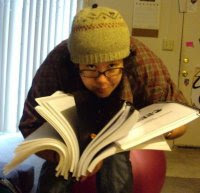Since my laptop crashed I've been frantically trying to write some portions of my thesis. My notes are mostly gone, so it's like a fresh start... which is usually good, but not always. I've started with a chapter on The Fruit of the Tree
Here's a little of what's been mustered:
Like many writers of her moment, Edith Wharton was deeply concerned with questions regarding nature and artifice. Although as scholar James L. Machor, author of Pastoral Cities, suggests, this concern was not a “central configuration of her work” but rather “a part of the imaginative pattern” (205). Still, even as a few threads in a finely wrought cloth, this part of the pattern is important and persistent across many of Wharton’s novels. Manchor looks to the canonical novel The House of Mirth for his example. There he finds that both the language and plot positioning of Nettie Crane’s story exhibit Wharton’s dissatisfaction with the notion of the “the home as pastoral enclave in the city” (206). For Manchor Lily Bart’s death “constitutes perhaps Wharton’s most ironic, tragic comment on the tenuous appeal but final inadequacy of urban-pastoral projections” (206). Although I find this reading quite compelling, I am somewhat troubled by its through reliance on the symbolic for it’s portrayal of the pastoral project. Of course when dealing with humanity and its cultural products, everything has a symbolic status, nevertheless I think an equally interesting critique of the urban-pastoral can be found in Wharton’s second, and less acclaimed novel, The Fruit of the Tree. In this work the urban-pastoral project in described in both symbolic and ecologic terms.
The opening pages of her 1907 novel The Fruit of the Tree establishes the tension between nature and artifice through Wharton’s descriptions of Justine Brent and John Amherst, two of the primary characters. Wharton presents Justine Brent in the following terms: “[s]he did not use, in speaking, the soothing inflection of her trade: she seemed to disdain to cajole or trick the sufferer. Her full young voice kept its cool note of authority, her sympathy revealing itself only in the expert touch of her hands and the constant vigilance of her dark steady eyes” (4). From this beginning Wharton develops traits in Justine that remain pivotal throughout the novel. Justine, although she fades into the background of the text for several chapters is really the main character, and it is through her perceptions that the reader first glimpses John Amherst who initially seems to be the main actor in the text.
Wharton states:
The nurse, sensitive by nature and training to all physical characteristics, was struck at once by the contrast between his alert face and figure and the silent way in which he moved. She noticed, too, that the same contrast was repeated in the face itself, its spare energetic outline, with the high nose and compressed lips of the mover of men, being curiously modified by the veiled inward gaze of the grey eyes he turned on her. It was one of the interests of Justine Brent's crowded yet lonely life to attempt a rapid mental classification of the persons she met; but the contradictions in Amherst's face baffled her, and she murmured inwardly "I don't know" (5)
Although this passage will likely slip from the readers mind as the text becomes powerfully focused on Amherst, this initial presentation of him is quite meaningful. Justine’s confusion regarding Amherst is well justified by the end of the novel, and so here Wharton is giving the reader exactly what she suggests in her description of Justine Brent, a character that is perceptive, honest, “sensitive to physical characteristics” and given to “rapid mental classification of the persons she met”. Justine Brent represents a scientific mind, a naturalist of sorts, in a highly urbanized setting. The contradictions in Amherst are troubling to her, but for the reader they seem perhaps enticing, after all the many appears to possess both a physique made for action and a mind made for reflection, two traits highly valued in men by western culture. If this troubles the perceptive Brent the reader might imagine that perhaps this is only because a girl in her “lonely” circumstance has not yet met a man possessing so many fine qualities.
However, Wharton’s prose continues to favor Brent’s perceptions. Outside of the hospital in the next chapter Justine “was amused to see that he [Amherst] failed to identify the uniformed nurse with the girl in her trim dark dress, soberly complete in all its accessories, who advanced to him, smiling under her little veil” (8). Brent can identify Amherst in the dim October evening, but he cannot pick her out, the language of this passage suggests that the reason for this is that Amherst has made her a social “type”, a nurse, rather than having examined her physical traits as is Justine Brent’s method.
Achievement unlocked – 52 movies
6 years ago


2 comments:
Your laptop crashed?? Oh, I'm sorry! Good you're working on your thesis, though. You're ahead of me. Hope your laptop recovers or you get a new one soon.
Julie Mae, Where are you?
Post a Comment